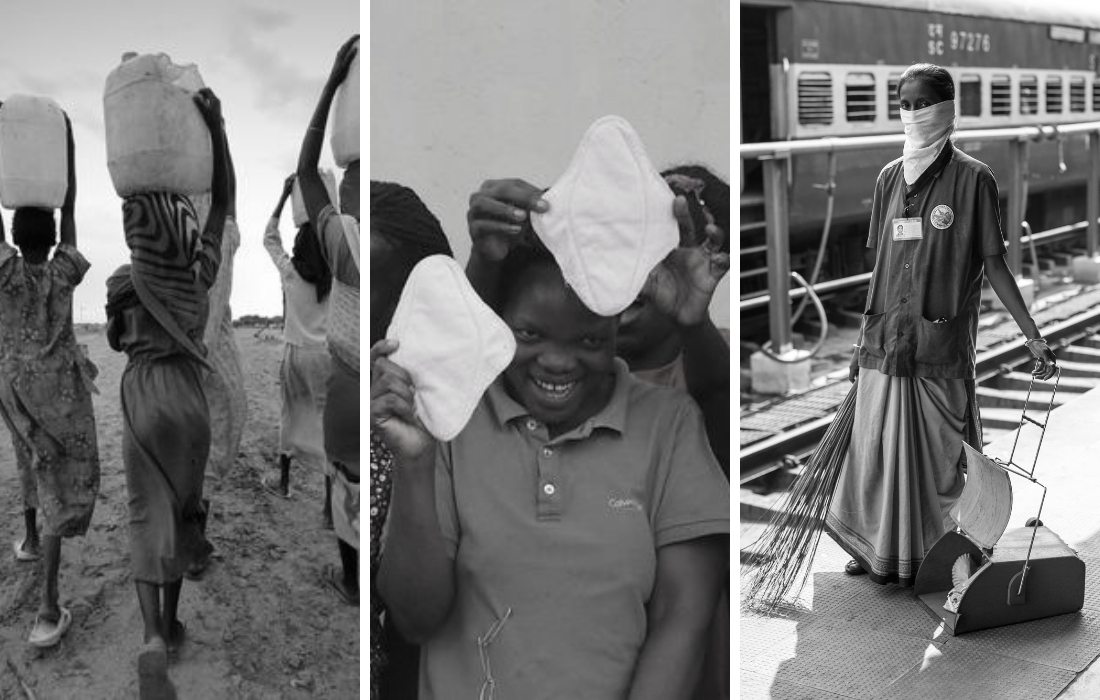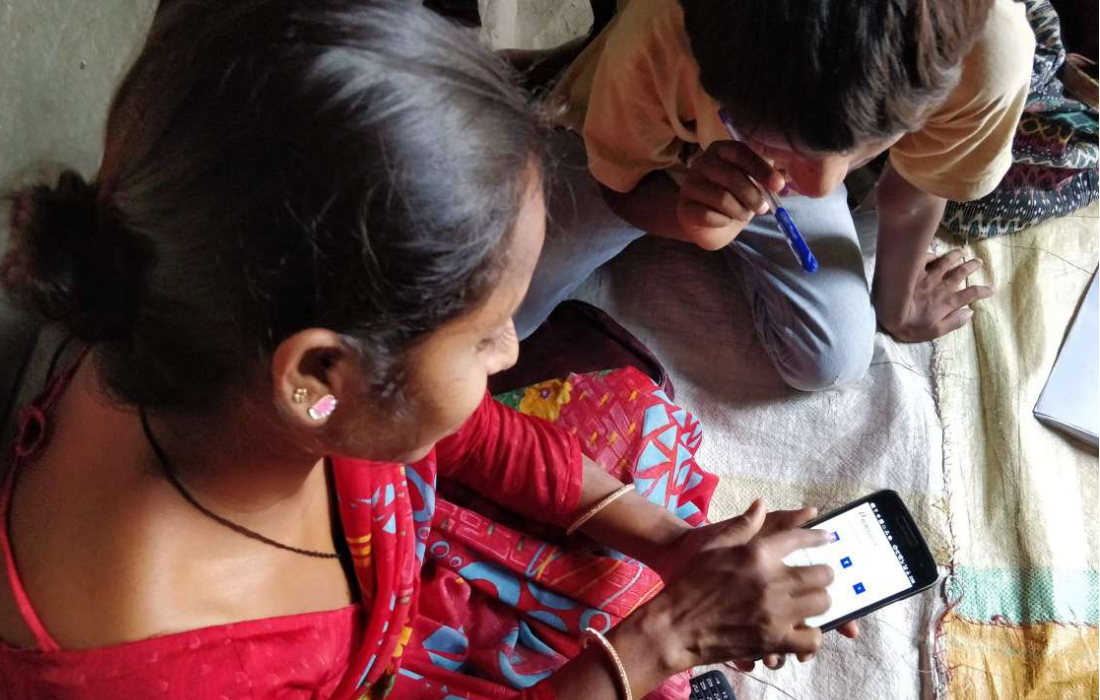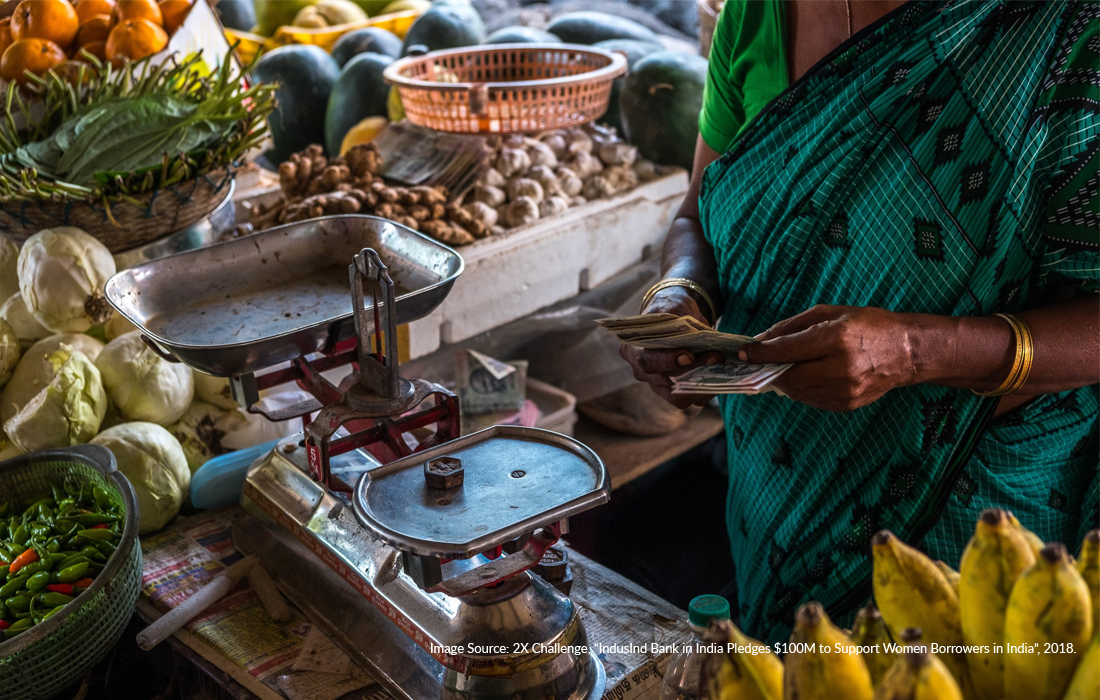Dalberg uses cookies and related technologies to improve the way the site functions. A cookie is a text file that is stored on your device. We use these text files for functionality such as to analyze our traffic or to personalize content. You can easily control how we use cookies on your device by adjusting the settings below, and you may also change those settings at any time by visiting our privacy policy page.
For many African nations, women head up the SMEs that make up the fabric of communities and economies. More must be done to help keep their businesses afloat.
A coalition of local Senegalese fashion designers has been engaging tailors to recoup lost income through the production of face masks, while a hairdressing salon that lost more than 50% of its monthly turnover in the initial weeks of the pandemic, has now completely redirected its business to exclusively selling hair care products online, as well as offering hair care tutorials for customers on its Youtube channel. Meanwhile in Kenya, a group of entrepreneurs who pre-Covid had been running kiosks but suddenly faced disrupted supply chains, curfews and reduced sales, have now moved to rearing chickens and beading to increase cashflow, with the support of BOMA Project, a non-profit.
These women-led businesses have found ways to keep their revenue flowing despite the crisis. But for many others, customers have dried up, and businesses are struggling to stay afloat. SMEs make up more than 90% of all businesses in economies across the African continent, and women comprise almost 60% of Africa’s self-employed workforce.1
These businesses are important not only for African economies but for the livelihoods of the vast swathes of women that run them, and their families. As Madji Sock, co-founder of the Women’s Investment Club in Senegal, and Dalberg Partner notes: “Women are so used to problem-solving, whether with their children, their extended families and their broader social groups. It is unsurprising that women are finding creative ways to respond to the pandemic but more needs to be done to ensure that women benefit from the broader package of measures that governments and policymakers are developing.”
Covid restrictions – disproportionate impacts
Covid response measures such as border closures and restrictions on movement have created additional challenges for women in the food sector, including shortages of raw goods and inputs. In Kenya, women-owned enterprises form the highest proportion of businesses engaged in the sale of fresh food commodities. Kenya’s coastal city of Mombasa relies on fresh goods from other parts of the country, but with reduced volumes of food items such as fruits and vegetables reaching the city, prices are being driven up.2
Meanwhile in Nigeria, businesses trading in local fresh produce – most of which are owned by women – are currently not able to source produce across state lines due to movement restrictions.3 Moreover, the closure of markets has impacted small scale food businesses especially in rural areas. A young woman from Bauchi state in Nigeria recently told us she had moved away from her village to the city to live with her brother: “When I was staying in the village there was no food and being alone with my parents was hard. Markets were closed down. I was selling on the roadside but they closed so there was no way for me to make money.”
As many consumers respond by applying cost-saving measures amid layoffs and looming recession concerns, and with social distancing measures limiting customers’ physical movement, the demand for goods and services in other sectors dominated by women is also falling, such as hair and beauty. One nail parlor owner in Kisumu, Kenya told us “I used to pay my employee 500 KSH to 800 KSH ($4.70-$7.50) per day but now she can go the whole day without pay. Since the corona came in it is just too bad. She gets a salary on commission basis. I feel for her because she is not working. She is just coming to work and there are no clients.”
Catering businesses typically run by women have also been suffering from customer concerns about hygiene and risks of infections. One woman who owns a small café in the Kibera region of Nairobi, Kenya, told us “People in slum areas like this think Corona is in the air so they come and say that they can get Corona so I had to close. I used to make a profit of 300KSH (US$2.80) per day. Now I am doing casual work of washing clothes”.
Online purchasing – shifts in consumer habits
Adding to declines in certain segments of demand, is an ongoing shift towards online e-platforms to purchase goods, as evidenced in an upsurge of online commerce in Kenya within a few weeks of quarantine and physical distancing guidelines. As more consumers shift to buy from online platforms, businesses that do not have these platforms will be left out.
One female vegetable seller in Dakar, Senegal, recently mentioned that even though markets have remained open three days a week, far fewer customers are shopping in person. Moreover, e-commerce platforms delivering fresh vegetables directly from large distributors have left her, along with other informal, female-led businesses with limited business digitization, particularly hard hit.
Time poverty – a worsening problem
A further challenge brought on by Covid is increased time poverty. The impact of school closures around the world has driven a significant growth in care work at home, disproportionately impacting women who have traditionally taken on these responsibilities. Pre-Covid analysis had already shed light on the fact that on average sub-Saharan African women carry out three times more unpaid care work than men, a ratio that has increased widely during the pandemic. Time poverty has placed further strain on women’s abilities to continue working at all, let alone navigate the challenges of steering businesses in turbulent economic times. Emerging evidence from the Women’s Investment Club in Senegal has found that a consistent key concern of female entrepreneurs within WIC’s network has been the struggle of balancing business responsibilities whilst children are out of school.
All of these factors – Covid restrictions, shifts in consumer behavior and increased time poverty – have dented turnover and placed significant liquidity pressures on women-led businesses to cover utility and supplier bills as well as employee salaries.
Already, findings from Senegal suggest that more than 60% of women-led MSMEs (micro, small and medium enterprises) in the trade sector have temporarily or permanently shut down as a result of Covid- compared to only 46% of male-owned businesses4. These numbers are echoed in the small and growing businesses (SGBs) within the Aspen Network of Development Entrepreneurs (ANDE) global network. A recent Dalberg-supported survey carried out on this network in April found that a greater number of women-led businesses (46%) have temporarily shut down due to Covid compared to male-led businesses (39%).
Pre-existing informality – and its implications
Cross-cutting all of the eminent issues brought about by Covid is the reality that women-led businesses are often informal. In Kenya more than 60% of unlicensed businesses are owned by women5. Women tend to own and lead smaller firms that are concentrated in more informal, low value-added sectors. This informality then plays a role in limiting women’s access to formal finance and social protections – a position exacerbated by Covid.
Moreover, women generally have lower access to valuable links to sector or trade associations that could otherwise build business resilience and provide timely support. In Nigeria, an International Trade Centre survey showed that only 32% of women-led SMEs interacted with trade support institutions6. These institutions are biased towards larger businesses which are more typically male-led, once again placing women at a disadvantage in terms of accessing otherwise valuable resources to navigate the current situation.
Recommendations for short and medium term response measures
Based on Dalberg’s long-standing experience of working with small and growing businesses on the continent and our emerging on-the-ground understanding of the key issues in both West and East African countries, we see a number of short- and medium-term measures as being critical to helping stem the negative impact of Covid and foster gender-inclusive economic recoveries.
In the short-term, immediate responses should consider:
- Debt relief and/or revisions to repayment schedules. Recognizing that additional emergency credit could risk adding further financial burdens down the line, we believe that financial interventions should be focused on how repayments can be restructured to account for near-term cashflow challenges. This could include grace periods for repayments on existing loans and subsidies for MSME foreclosures.
- Tailored business coaching support to reopen businesses while maintaining physical distancing guidelines. Innovations will be required to revise business models to the ‘new normal’ of social distancing. Female-owned businesses in sectors such as retail, beauty and catering should be provided with advice on how to steer operations to capture business opportunities even in these unusual economic times e.g., through advance appointments, zoned spacing, and delivery service options amongst others.
- Training and technical assistance to repurpose business capacity. Given the increased consumer demand for specific products e.g., face masks, and other sanitation and cleaning products, women-led businesses should be supported to consider how to adapt business capacity and skills to capture some of these new ‘essentials’.
- Collecting more and better data: The effectiveness of both short-term and medium-term measures is currently being hindered by a lack of sex-disaggregated data. Taking action now to collect more qualitative and quantitative data on the impact of Covid on the lived experiences of men and women will help drive more effective and gender-inclusive decision-making. The Women’s Investment Club in Senegal, for example, has been collecting data from its members through both surveys as well as organizing “safe space talks” for female entrepreneurs to raise concerns.
In the medium-term, measures should consider:
- Stimulating demand: The economic recovery will likely require a large stimulus of public demand. Recognizing that many women-led businesses are unlicensed and informal, large scale public procurement plans will need to consider whether ‘lowering the bar’ on formality can help ensure that women can benefit from such a package. It remains to be seen, for example, whether the Senegalese government’s plans for an e-Commerce platform7 for SMEs in response to Covid will be sufficiently inclusive of women-led businesses and considers those that may not have company websites.
- Extending national social protection programs: As noted above, and related to the typical informality of women-led businesses, national social protection schemes may need to revisit their guidelines and norms around coverage and formal business licensing expectations in female dominated sectors such as food, catering and hospitality, teaching, retail and tourism.
- Investing in digital efficiencies for longer-term resilience: With the exception of mobile money payments, many MSMEs on the continent remain analogue-based and poorly digitized. Digitization efforts could help scale currently smaller women-led businesses and could serve to capture medium-term shifts in customer behaviour as well as bolster longer-term business resilience. Efforts could include the development of aggregation/eCommerce platforms and eMarketing channels, as well as broader ecosystem investments that provide greater efficiencies for women-owned businesses e.g., digital identification systems that can in turn support better access to finance and financial packages that can lower the total costs of connectivity (i.e., the combined costs of physical devices, digital literacy and costs of data).
A gender inclusive approach – the way forward
Although many of these measures are urgent, it is critical that a gender lens is not lost in the rush to execute them. In the near-term, relief measures should ensure that women-led businesses can benefit equally from all measures undertaken, irrespective of whether they are formally licensed or not. Moreover, any plans for training or other forms of support should consider whether their delivery is accessible in terms of women having the physical means to attend e.g., adequate handsets and/or digital devices, as well as the time to participate e.g., sessions that are scheduled during times that are feasible for women to attend despite their increased household care burden.
The socio-economic costs of the pandemic are clearly disproportionately impacting women and their businesses, and initial responses to-date suggest that the inequalities between female and male-owned enterprises could widen further. In Senegal, for example, current measures being taken by the government to offer partial guarantees to the banking sector are not reaching women-led businesses given their lack of access to formal finance prior to the pandemic.
More needs to be done. And, it is paramount that responses to supporting SMEs on the continent adopt a gender inclusive approach, and empower women as agents of their countries’ economic recoveries.
2 Dalberg, 2020, The Human Account – Baseline Insights and Opportunities
4http://www.peopledatasense.com/first-impacts-of-covid-19-on-senegalese-population/
5https://www.knbs.or.ke/?p=2704
6http://www.intracen.org/uploadedFiles/intracenorg/Content/Publications/SheTrades%20Nigeria_web.pdf
7 https://unctad.org/en/pages/newsdetails.aspx?OriginalVersionID=2342







